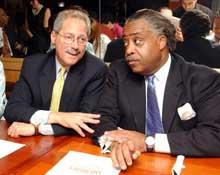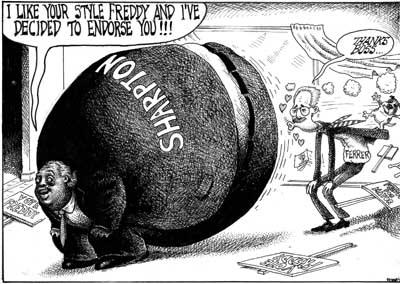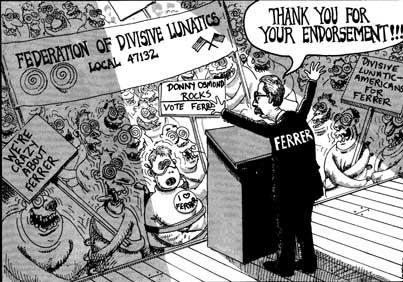The price of a mayor
Previous: The NYC mayoral race: how about "None of the above"?
"Price" now means two things. First there was the cost of finding one (the mayoral race), and now we look at what it takes to bribe a mayoral candidate.
Bravo to Hizzoner, Mayor Mike. From the New York Post (registration required, use bugmenot.com):
Bloomberg will probably win despite 1199 endorsing Ferrer. Bloomberg's approval rating is still above 60%, because he may have "converted" to the Republican Party but is still liberal enough not to alienate a majority of New York voters. As David Siefman wrote in the Post, "the mayor's single most important selling point in a Democratic town is that he's governed largely as a Democrat."
The NYC Democratic mayoral primary was held on Monday, September 12. Turnout was extremely low, only 17% ("An estimated 456,263...of 2.6 million active Democrats in the Big Apple"). The lack of Democratic desire to unseat Bloomberg prompted him to joke that night at a celebrative rally that more attended his event than voted in the primary. The first official result was that Ferrer won 39.95% of the tallied votes, only 290 votes short of an outright victory. New York state law stipulates that a primary candidate must get 40% or more to win, otherwise a runoff election must be held between the top two vote-getters. Anthony Wiener came in second with 29%, and with very poor prospects against only Ferrer (especially because Ferrer appeals far more to minorities), Wiener dropped out of the race on Wednesday.
Incredibly, the Board of Elections said that state law still required a runoff election, at a possible cost of $12 million, though there would be only one candidate! Part of the cost would be over $400,000 each in matching funds to the Ferrer and Wiener campaigns. However, ballots needed to be recounted, and some mail-in ballots still needed to be processed. Thankfully, the Board of Elections finished on Sunday, certifying that Ferrer actually won 40.15% of the vote.
Ferrer was the only NYC mayoral candidate to campaign on the September 11 anniversary. The rest -- Virginia Fields, Gifford Miller, Anthony Wiener, and incumbent Mike Bloomberg -- all respected the tragedy and wouldn't even air commercials. Ferrer, however, shamelessly used it as a photo-op, and to emphasize winning Al Sharpton's endorsement:

Or as Sean Delonas, Post cartoonist, depicted the meeting:

Delonas was also accurate four years ago (ironically published the morning of the 9/11 attacks) about Ferrer's divisive campaigning:

But Ferrer is not alone in his tactics or platform. From the September 12th print edition of the Post, the Democratic candidates' platforms are laid out:
Ferrer wants to reinstate the commuter tax. Wait a minute, Freddie: I already pay 2% in income tax to a city I work in but don't reside in. Just how much does he think I and others will take before we give up our city jobs? At a certain threshold of taxation, no matter how well we're paid, we'll lose enough in taxes that it's no longer worth our time to travel to Manhattan for work. This will undoubtedly backfire like the failed 1990 luxury tax, which on the whole lost revenue.
Virginia Fields wants the commuter tax too. Gifford Miller and Anthony Wiener aren't as specific: they just want to soak the rich, which I've pointed out never works. Miller wants to raise taxes on New Yorkers earning more than $500,000 per year, which would drive many wealthy people out of the city, just like when Bloomberg started his tax hikes. Miller's proposed $200 million in small business tax cuts wouldn't be enough to save those businesses that depend on wealthy people's patronage. Wiener wants to raise taxes on those making more than $1 million, which will have the same effect, regardless of his 10% tax cuts for those making under $150,000 a year.
The one thing common to all the Democratic candidates: kowtowing to the teachers unions. All four candidates support the cliché of hiring more teachers to reduce class sizes, and paying teachers more. There's still no evidence that smaller class sizes help performance, but the numbers solution will ensure that the teachers union will back any of the Democratic mayoral primary winner. Teachers pay union dues based on a percentage, and more teachers means even more money controlled by Randy Weingarten (president of the United Federation of Teachers).
I still would prefer "none of the above," but at least Bloomberg isn't in the teachers unions' pocket. A few years ago, he wrested NYC schools from effective UFT control, after the New York state legislature passed a law placing the Board of Education, and thus the city's public schools, under the mayor's control. It was a long-overdue necessity to make someone accountable for the atrocious condition of the NYC school system. There's still a long way to go. Standardized test scores may be up, but it's very probable that the questions have been dumbed down. And Bloomberg is still having difficulty ending "social promotion," the practice of passing failing students so they'll move on to the next grade with their proper age group.
"Price" now means two things. First there was the cost of finding one (the mayoral race), and now we look at what it takes to bribe a mayoral candidate.
Bravo to Hizzoner, Mayor Mike. From the New York Post (registration required, use bugmenot.com):
MIKE'S QUID PRO NOJust another New York City mayoral race, replete with backroom deals that trade political favors for public backing. My cynicism tells me that Bloomberg may have refused, knowing that if a "deal" were leaked, subsequent accusations of effective bribery would destroy his campaign. Now, if 1199 wouldn't endorse Bloomberg unless he agreed to their deal, why should we think they wouldn't demand the same of Ferrer? Once they back him, you can bet it's because he quietly said, "Yeah, I'll do that, I just need your support."
September 19, 2005 -- Higher-ups at powerhouse health-care union Local 1199 offered Mayor Bloomberg their politically potent endorsement if he would put 25,000 private home health-care aides on the city payroll, sources told The Post.
But the Republican mayor rejected out of hand the overture, which would have cost upward of $500 million — and 1199 is expected to throw its support behind Democrat Fernando Ferrer tomorrow.
Had the deal gone through, the new city workers, most of whom are not unionized, would presumably have joined 1199.
Brass at 1199 and top Bloomberg staffers were in high-level negotiations on and around primary day last week, as the health-care behemoth — which many expected to back Ferrer much earlier — tried to figure out who it would support.
"It was non-negotiable," said one source of the demand that the 25,000 employees of private agencies, most of them nonprofits, be added to the public payroll.
"They wanted to make that a quid pro quo for the endorsement."
The Bloomberg staff's response: "No deal. No way," the source said....
For Ferrer, 1199's backing is critical, as a slew of normally Democratic-leaning unions, including District Council 37, have sided with Bloomberg.
For Ferrer to have a real shot at dethroning a mayor willing to spend upwards of $100 million of his own money on the campaign, he'll need the troops and organizational skills of a large union, insiders say.
It was unclear if Ferrer, who received the 1199 endorsement for mayor in the 2001 Democratic primary campaign, would sign off on the same home health-care worker deal offered to Bloomberg.
At present, home health workers aren't city employees. Instead, City Hall hires private contractors to provide manpower and services.
Although the city pays these workers' salaries, that's a fraction of what it would cost if the taxpayers also had to pick up the tab for their health insurance, pensions and other fringe benefits.
The proposed deal to Bloomberg reminded many insiders of an alleged bargain between Rivera and Gov. Pataki in the 2002 gubernatorial election.
In that race, Rivera got a $1 billion health-care package for his 220,000- member union around the same time the normally Democratic union backed Republican Pataki against Carl McCall.
Yesterday, Ferrer picked up the endorsement of Rep. Charles Rangel (D-Manhattan)....
Bloomberg will probably win despite 1199 endorsing Ferrer. Bloomberg's approval rating is still above 60%, because he may have "converted" to the Republican Party but is still liberal enough not to alienate a majority of New York voters. As David Siefman wrote in the Post, "the mayor's single most important selling point in a Democratic town is that he's governed largely as a Democrat."
The NYC Democratic mayoral primary was held on Monday, September 12. Turnout was extremely low, only 17% ("An estimated 456,263...of 2.6 million active Democrats in the Big Apple"). The lack of Democratic desire to unseat Bloomberg prompted him to joke that night at a celebrative rally that more attended his event than voted in the primary. The first official result was that Ferrer won 39.95% of the tallied votes, only 290 votes short of an outright victory. New York state law stipulates that a primary candidate must get 40% or more to win, otherwise a runoff election must be held between the top two vote-getters. Anthony Wiener came in second with 29%, and with very poor prospects against only Ferrer (especially because Ferrer appeals far more to minorities), Wiener dropped out of the race on Wednesday.
Incredibly, the Board of Elections said that state law still required a runoff election, at a possible cost of $12 million, though there would be only one candidate! Part of the cost would be over $400,000 each in matching funds to the Ferrer and Wiener campaigns. However, ballots needed to be recounted, and some mail-in ballots still needed to be processed. Thankfully, the Board of Elections finished on Sunday, certifying that Ferrer actually won 40.15% of the vote.
Ferrer was the only NYC mayoral candidate to campaign on the September 11 anniversary. The rest -- Virginia Fields, Gifford Miller, Anthony Wiener, and incumbent Mike Bloomberg -- all respected the tragedy and wouldn't even air commercials. Ferrer, however, shamelessly used it as a photo-op, and to emphasize winning Al Sharpton's endorsement:

Or as Sean Delonas, Post cartoonist, depicted the meeting:

Delonas was also accurate four years ago (ironically published the morning of the 9/11 attacks) about Ferrer's divisive campaigning:

But Ferrer is not alone in his tactics or platform. From the September 12th print edition of the Post, the Democratic candidates' platforms are laid out:
Ferrer wants to reinstate the commuter tax. Wait a minute, Freddie: I already pay 2% in income tax to a city I work in but don't reside in. Just how much does he think I and others will take before we give up our city jobs? At a certain threshold of taxation, no matter how well we're paid, we'll lose enough in taxes that it's no longer worth our time to travel to Manhattan for work. This will undoubtedly backfire like the failed 1990 luxury tax, which on the whole lost revenue.
Virginia Fields wants the commuter tax too. Gifford Miller and Anthony Wiener aren't as specific: they just want to soak the rich, which I've pointed out never works. Miller wants to raise taxes on New Yorkers earning more than $500,000 per year, which would drive many wealthy people out of the city, just like when Bloomberg started his tax hikes. Miller's proposed $200 million in small business tax cuts wouldn't be enough to save those businesses that depend on wealthy people's patronage. Wiener wants to raise taxes on those making more than $1 million, which will have the same effect, regardless of his 10% tax cuts for those making under $150,000 a year.
The one thing common to all the Democratic candidates: kowtowing to the teachers unions. All four candidates support the cliché of hiring more teachers to reduce class sizes, and paying teachers more. There's still no evidence that smaller class sizes help performance, but the numbers solution will ensure that the teachers union will back any of the Democratic mayoral primary winner. Teachers pay union dues based on a percentage, and more teachers means even more money controlled by Randy Weingarten (president of the United Federation of Teachers).
I still would prefer "none of the above," but at least Bloomberg isn't in the teachers unions' pocket. A few years ago, he wrested NYC schools from effective UFT control, after the New York state legislature passed a law placing the Board of Education, and thus the city's public schools, under the mayor's control. It was a long-overdue necessity to make someone accountable for the atrocious condition of the NYC school system. There's still a long way to go. Standardized test scores may be up, but it's very probable that the questions have been dumbed down. And Bloomberg is still having difficulty ending "social promotion," the practice of passing failing students so they'll move on to the next grade with their proper age group.


2 Comments:
"The NYC mayoral race: how about "None of the above"? "
In the Russia Federation You CAN vote for "none of the above"
"Against all" is how it would be translated into English,
I recall reading that in one Provincial Election
Against all WON
Twice actually lol
That would be a great option to have. It might delay government to force an additional election (or two), but the initial election could be held, say, half a year before inauguration. With current technology, new campaigns can get their messages out in a couple of months of media blitzing.
It's a shame American voters feel so obligated to vote for someone, i.e. the least of the evils.
Post a Comment
Subscribe to Post Comments [Atom]
<< Home